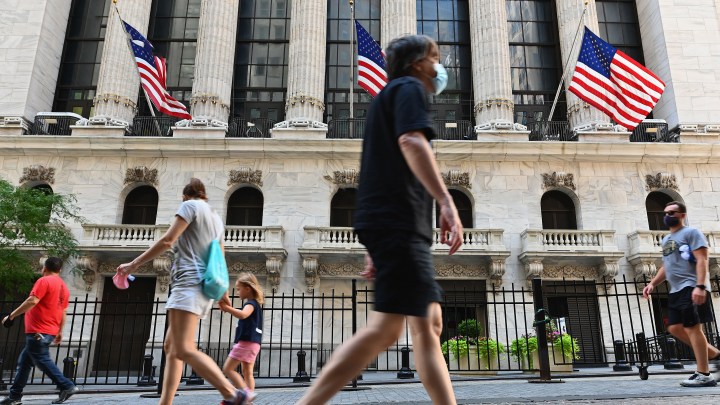
Why do economists compare recessions to letters of the alphabet?
Why do economists compare recessions to letters of the alphabet?

During last night’s debate, moderator Chris Wallace asked the candidates a question about how they thought this economy would recover from the recession. The Trump administration has said the recovery will be V-shaped, while former Vice President Biden has said it’ll be K-shaped. We explain what that means.
When you’re a kid, you learn the alphabet song. It’s just a device to help you remember your letters.
This is kind of what economists are doing with the V-shape, K-shape thing. They’re using the alphabet as a device to explain how we bounce back from recessions.
“It’s sort of a catchy and almost cute way of summarizing a very complex situation,” said Seth Carpenter, chief U.S. economist at UBS.
Think of it this way: If you charted out U.S. GDP growth over time what shape would you see?
If it’s a V-shape, economic growth fell fast and hard but then bounced back just as fast.
There’s the U-shape, “where things fall, and then they take a long time at a low level, before starting to recover,” Carpenter said.
Also, the W-shape: up and down, up and down. The L-shape. The J-shape.
And the K-shape: one leg up, one leg down.
“The K is more nuanced,” said Erik Lundh, senior economist at research group the Conference Board. “It’s not talking about just headline GDP growth, it’s talking about how different groups inside of the economy are recovering.”
The term seems to have cropped up in response to this recession because certain industries, like restaurants, have been hit way harder than others. And so have certain people.
Lundh says you could have a recovery that’s V- or J-shaped and K-shaped, where the data shows the broader economy bouncing back but large groups being left out.
There’s a lot happening in the world. Through it all, Marketplace is here for you.
You rely on Marketplace to break down the world’s events and tell you how it affects you in a fact-based, approachable way. We rely on your financial support to keep making that possible.
Your donation today powers the independent journalism that you rely on. For just $5/month, you can help sustain Marketplace so we can keep reporting on the things that matter to you.


















